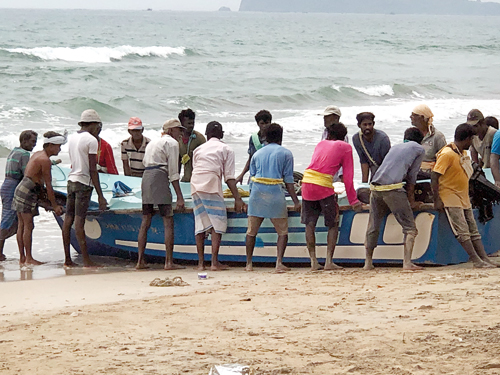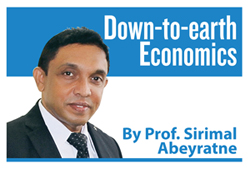Fishing for nothing
View(s):
Fishing in Trincomalee
Five years ago, I met some activists who were organising local people and protesting against the location of a power plant in Sampur. I wanted to know why they were against the power plant, because I was involved in a related project of the government. The government had decided to shift the proposed electricity generation plant in Sampur from coal power to liquified natural gas (LNG) power. And, I was serving as the Chairman of an Experts Committee investigating the potential economic, financial, and environmental costs of the government’s decision.
I was told by the activists that these areas were the traditional agricultural land and the traditional fishing sites of the “poor” local communities; thus their livelihood activities were going to be affected by the proposed power plant, whether it is coal or LNG.
I had a different question to ask and, in fact, I asked it sometimes from some of the spokesmen. “Do they also think that their sons and daughters should continue to be ‘poor’ farmers and fishermen just like their parents’ generation?”
Generic question
My question was a generic one – whenever and wherever I see a protest as such, I cannot help myself as the same question comes to my mind again and again.
Although five years have been passed by since then, I didn’t hear about any development in the Sampur area. Neither did I see any significant preparation for development in the entire Trincomalee other than opening a few tourist hotels. Untapped physical environment in the area, including the Trincomalee Harbour, continued to remain as it was except for the fact that there is now peace.
Last week I was in Trincomelee, where I met Jayanthan, a young employee serving at a tourist hotel restaurant. He seemed to have been well trained in the hospitality industry and who also seemed to be quite friendly with guests like myself. As he was explaining to me about the area, the people and their mixed culture, I asked him more details over some of the matters.
One of my questions to him was about the employment opportunities for educated youth in Trincomalee: “What are the kinds of jobs available for young people in this area, particularly for those who have passed O/Level or A/Level exams?”
He thought for a while and, then answered: “I can see most of them going in to farming or fishing or wage-labour work. I am not sure if there is anything else.”
I said: “I guess, that’s what their parents were doing too.”
He answered with a smile on his face: “Yes sir, you are right; they also did the same jobs. I can’t think of new jobs available for them even if they have done O/Level and A/Levels. Few of them have found jobs in tourist hotels, but tourism is also down now.”
Young fishermen
It was just after my breakfast at the restaurant by the beach; I saw about 20 – 25 people gathering on the beach to pull down a fishing net. As I was eagerly gazing at them, Jayanthan, who was serving me, said: “Sir, you can also go there and see how they pull down the fishing net to the seashore; it might take 2 – 3 hours. This is the time those fishing boats are returning after fishing in the night.”
I went to the beach after the fishermen started pulling the net, by standing alone two lines to pull the net from its two ends. Their moving posture reminded me of a dancing style, although they didn’t sing lyrics like “hela helai heleiya…” as in the good old days. It was now closer to 10 am and the beach on the Eastern coast was getting heated from the rising sun. The fishermen should be in the sun in order to engage in their work of pulling the fishing net. While the fishing trawler was still far away in the middle of the sea, I could also notice two other men swimming in the water and helping to balance the fishing net from that end.
To my surprise, confirming Jayanthan’s remark, many of the fishermen in the group were youth; they appear to be in the age of 20s or 30s. When the net was being pulled closer to the seashore, the owner of the fishing business approached the scene. He appeared to be in his late middle age and was wearing a sarong and a short-sleeved white shirt. He also came and stood nearby to see the catch of the day. In the meantime, crows too gathered on the seashore to get their share.
Surviving versus thriving
As the net was completely pulled down to the shore, with an excitement I too got closer and peeped into it. It was astonishing that the catch was very small; there was no more than 10 – 15 kg of small fish, after toiling overnight and pulling the net to the shore for few hours.
 It seemed that the fishermen already knew about what they caught even before it was brought to the seashore. There was no excitement among them; after pulling down the net, even without looking at it many of them quietly started to attend other remaining work. The owner of the business too walked away keeping his head down. Two men collected the fish in a basket and carried it away.
It seemed that the fishermen already knew about what they caught even before it was brought to the seashore. There was no excitement among them; after pulling down the net, even without looking at it many of them quietly started to attend other remaining work. The owner of the business too walked away keeping his head down. Two men collected the fish in a basket and carried it away.
I remembered what some of us in Colombo used to say: “All around the country, it is the ocean; but why on earth, should we then import fish?” At the same time, some us grumble about the exorbitant fish prices in this country.
In the evening as I met Jayanthan again, I asked him: “How much is the daily wage of all those people who attended fishing and pulling the net today?”
He replied: “Only if they catch fish, they get a share after selling it. For today, they didn’t get anything because there was no fish.” Just like in the case of domestic agriculture, fishing too makes them just survive from generation to generation, and not thriving. After all, getting through O/Levels or A/Levels hardly makes a difference for their survival.
The other side
At the last O/Level examination, over 600,000 students from all over the country sit for the exam; half of them also sat for the A/Levels exams. It shows roughly the number of jobs that the country should create every year. I begin to wonder whether we create that many jobs in the economy every year.
However, instead of creating new jobs for the educated, we have designed policies, programmes and activities to keep them in the same livelihood activities such as agriculture and fishing, because these are important breeding grounds for politics, not economics.
From Colombo we say that the country has to be “self-sufficient” in agricultural produce and fish catch for our “food security”. In effect we justify pushing people and their children, and generations into unproductive economic activities. But they hardly come out of poverty that they have inherited from the previous generation.
We design new subsidies and government assistance programmes to keep those people locked up in the same unproductive economy. These programmes have added something to survive them throughout our history, but they have hardly contributed anything for them to thrive and escape poverty.
You might raise a valid point regarding our unemployment which is as low as 5.8 per cent even in the midst of the COVID-19 pandemic, whereas it is much higher in many other countries. True, but let me show you why. Those fishermen I observed on the seashore are, actually “employed” by the definition of employment, whether they catch fish or not. Similarly, all the people who are involved in their livelihood activities whether it is fishing or farming or any other, they are all employed by the definition even if they just survive. The issue in question is how to create productive job opportunities for educated youth in a modern economy.
(The writer is a Professor of Economics at the University of Colombo and can be reached at sirimal@econ.cmb.ac.lk and follow on Twitter @SirimalAshoka).



